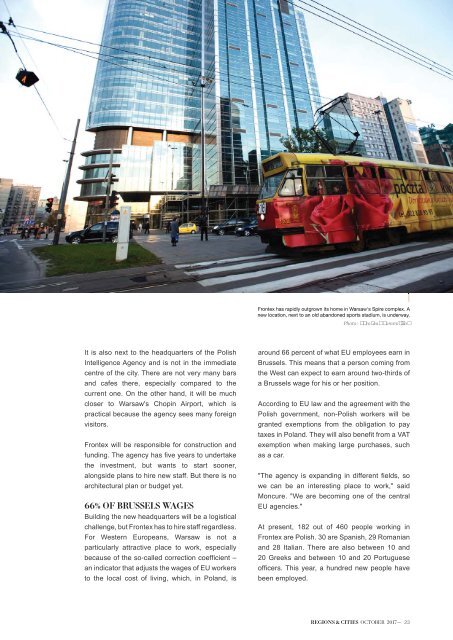Regions & Cities: The EU Agencies Race
EUobserver's 2017 Regions & Cities magazine takes a closer look at EU agencies and the benefits for cities and regions to host them. The UK leaving the EU has prompted a scramble for the European Medicines Agency and the European Banking Authority among most of the remaining member states. But what makes a city competitive? Which cities stand a good chance to become the new hosts? And what do EU agencies bring to the local economy?
EUobserver's 2017 Regions & Cities magazine takes a closer look at EU agencies and the benefits for cities and regions to host them. The UK leaving the EU has prompted a scramble for the European Medicines Agency and the European Banking Authority among most of the remaining member states. But what makes a city competitive? Which cities stand a good chance to become the new hosts? And what do EU agencies bring to the local economy?
You also want an ePaper? Increase the reach of your titles
YUMPU automatically turns print PDFs into web optimized ePapers that Google loves.
Photo: roeaommiio<br />
It is also next to the headquarters of the Polish<br />
Intelligence Agency and is not in the immediate<br />
centre of the city. <strong>The</strong>re are not very many bars<br />
and cafes there, especially compared to the<br />
current one. On the other hand, it will be much<br />
closer to Warsaw's Chopin Airport, which is<br />
practical because the agency sees many foreign<br />
visitors.<br />
Frontex will be responsible for construction and<br />
<br />
the investment, but wants to start sooner,<br />
alongside plans to hire new staff. But there is no<br />
architectural plan or budget yet.<br />
66% OF BRUSSELS WAGES<br />
Building the new headquarters will be a logistical<br />
challenge, but Frontex has to hire staff regardless.<br />
For Western Europeans, Warsaw is not a<br />
particularly attractive place to work, especially<br />
<br />
an indicator that adjusts the wages of <strong>EU</strong> workers<br />
to the local cost of living, which, in Poland, is<br />
around 66 percent of what <strong>EU</strong> employees earn in<br />
Brussels. This means that a person coming from<br />
the West can expect to earn around two-thirds of<br />
a Brussels wage for his or her position.<br />
According to <strong>EU</strong> law and the agreement with the<br />
Polish government, non-Polish workers will be<br />
granted exemptions from the obligation to pay<br />
<br />
exemption when making large purchases, such<br />
as a car.<br />
<br />
we can be an interesting place to work," said<br />
Moncure. "We are becoming one of the central<br />
<strong>EU</strong> agencies."<br />
At present, 182 out of 460 people working in<br />
Frontex are Polish. 30 are Spanish, 29 Romanian<br />
and 28 Italian. <strong>The</strong>re are also between 10 and<br />
20 Greeks and between 10 and 20 Portuguese<br />
<br />
been employed.<br />
REGIONS & CITIES OCTOBER 2017— 23

















